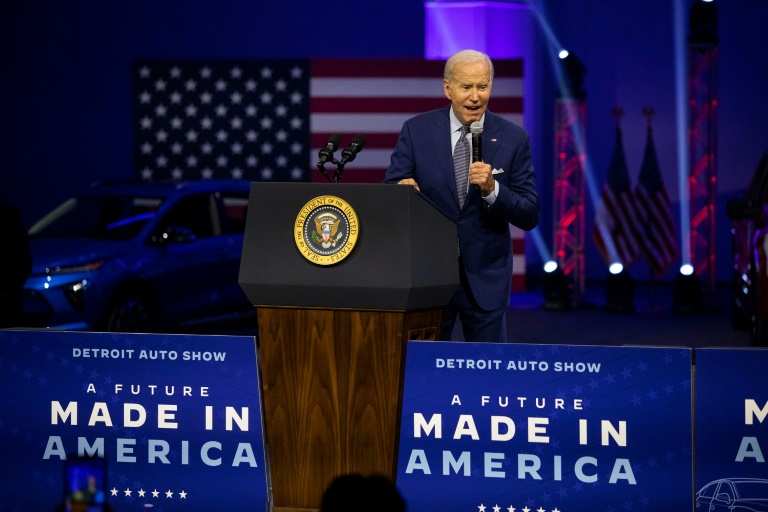During his trip to the Detroit Auto Show in September 2022, US President Joe Biden touted the very 'made in America' provisions of the Inflation Reducation Act that the EU has called 'discriminatory'
Certain provisions in US President Joe Biden’s landmark climate action plan, the Inflation Reduction Act (IRA), have provoked strong responses from the European Union, which fears it could hurt its industry.
With the IRA set to be one of the main topics discussed during French President Emmanuel Macron’s state visit to Washington this week, AFP answers some key questions about the spat.
– What are the measures in the IRA? –
The IRA, a behemoth piece of legislation that largely focuses on climate and social spending, provides more than $430 billion in US investments.
Of that sum, $370 billion will go toward reducing greenhouse gas emissions 40 percent by 2030, making it the largest-ever US program to combat climate change.
Some of the investments are in the form of tax cuts for companies that invest in clean energy, but there are also significant subsidies for electric vehicles, batteries and renewable energy projects — if they are manufactured in the United States.
One is a $7,500 subsidy for households buying US-made electric vehicles, while another gives benefits to manufacturers of wind turbines and solar panels who use US steel.
– Why is the IRA ruffling European feathers? –
The IRA has caused a stir at EU headquarters in Brussels as well as in other European capitals, which see the various subsidies as “discriminatory,” in particular against the bloc’s auto manufacturers.
“This is unacceptable for the EU. As it stands, this text is extremely protectionist, to the detriment of European exports” said Czech industry minister Jozef Sikela, whose country currently holds the rotating EU presidency.
He did, however, stress the “goodwill on both sides” after a meeting of EU ministers with US Trade Ambassador Katherine Tai.
In early November, EU Internal Market Commissioner Thierry Breton threatened to “go before the WTO” and consider “retaliatory measures” if the United States did not reverse its subsidies.
“In some cases, the subsidies that the Biden administration offers are four to 10 times the maximum amount authorized by the European Commission,” said French Finance Minister Bruno Le Maire, who called on the Commission to create “European preferential measures or to accelerate the use of reciprocity instruments.”
According to a French official briefing reporters ahead of Macron’s state visit, the hot button issue will be on the table.
“We fully understand the US desire to be more independent,” said the official Monday, “but the problems come from the fact that in Europe we do not have this type of discriminatory instrument, we respect the rules of the WTO in this area.”
The official said that France wanted “Europe too, not just the United States, to emerge stronger” from the period of multiple crises that the continent is going through.
– Is there leeway to amend the IRA? –
Even if Biden wanted to walk back certain measures, or to broaden the number of beneficiaries, his legislative options are quite limited.
Any action will be more complicated when his Democratic Party loses their House of Representatives majority in January, after their loss in the November midterms.
It’s also not clear that Biden is even thinking about touching a key plank of his presidential legacy, which he salvaged only after protracted negotiations in the Senate.
Biden’s initial proposal, the Build Back Better Act, was even more ambitious, providing $1.7 trillion dollars of investment. That plan cleared the House at the end of 2021 but was blocked in the Senate.
The subsidies in question are also very popular, especially in states such as Ohio and Michigan, where the automotive industry remains powerful and their “swing state” status gives them considerable political clout.
However, the United States is hoping to smooth things over with its European partners.
After a virtual exchange with France’s Le Maire, US Trade Representative Tai on Monday said that the countries are “working together to strengthen common understanding of legislation.”
For his part, Macron hopes to go further and obtain from his US counterpart “exemptions for a certain number of European industries, perhaps on the model of what it already agrees for Mexico and Canada,” according to an adviser.
The two US neighbors, who share a free trade pact with the United States, received carve-outs in the IRA for electric vehicle subsidies.









